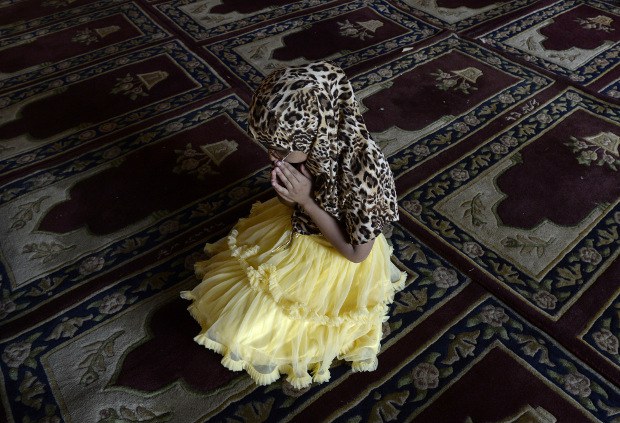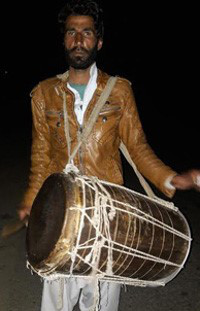India: Kashmir Drummer Calls Muslim Faithful to Morning Meal
2017.06.22
Kupwara, India
 A child prays inside Kashmir’s main mosque Jamia Masjid during Ramadan in downtown Srinagar, June 15, 2017.
A child prays inside Kashmir’s main mosque Jamia Masjid during Ramadan in downtown Srinagar, June 15, 2017.
In the dead of night, when security personnel patrol deserted streets in insurgency-torn Indian Kashmir, Saif-u-din Khatana ventures out, breaking the eerie silence by beating a drum in village lanes to wake people up for pre-dawn meals during Ramadan.
He has done this for four years now, the latest cycle of unrest notwithstanding.
“I know it is risky – I could be picked up and grilled by security forces, shot by separatists – but it gives me immense satisfaction,” Khatana, 38, a native of Kashmir’s Kupwara district, told BenarNews.
“The month of Ramadan is a month of blessings and forgiveness. I do this more for rewards from Allah rather than peanuts offered by people at the onset of Eid,” Khatana said.

Khatana (pictured) is a daily wage laborer as well as a sehar khan (Ramadan drum beater). During Ramadan, he leaves his house at 12:30 a.m. and beats his drum through the forested district to ensure he wakes as many people as he can for the 3:40 a.m. meals.
“There’s always a fear of an attack by wild animals or stray dogs,” he said modestly, even as he passed helmet-clad security personnel patrolling the streets of the insurgency-ravaged district. “People, good people, pray for my well-being,” he added.
Kupwara is on the de-facto border, called the Line of Control (LoC), which divides Kashmir between India and Pakistan. The two countries claim the Himalayan region in its entirety and have fought two full-blown wars over its ownership.
Since the late 1980s a separatist insurgency in Indian-administered Kashmir, known on the Indian side as Jammu and Kashmir state, has left more than 70,000 people dead.
Khatana, like many other sehar khans, is unmoved by claims that the centuries-old tradition of drumming to wake people during Ramadan is dying because of the separatist insurgency.
“Many gave this up during the mid-1990s when insurgency was at its peak and curfew remained imposed even during the month of Ramadan,” Nisar Ahmad, a drummer from Baramulla district near the LoC, told BenarNews.
Ahmad, 50, said he and other sehar khans are returning to the streets because peace is returning to the region.
“With the gradual return of peace over the past few years some people resumed this noble work again,” said Ahmad, who has been a sehar khan since 2001.
But his belief is unfounded.
‘They should not panic’
Muslim-majority Kashmir is undergoing a fresh cycle of violence, with near-daily street clashes between anti-India protesters and security forces since the killing of a top separatist leader last July.
More than 100 people have died and more than 10,000 were injured in this months-long violence.
India blames Pakistan for backing and funding separatism in Kashmir, a charge Islamabad repeatedly denies, saying the decades-old violence in Kashmir is a result of India’s oppressive rule.
On Thursday, Indian security forces claimed to have killed three suspected militants belonging to Lashkar-e-Taiba (LeT), a Pakistan-based outfit, during an encounter in south Kashmir’s Pulwama district, triggering intense clashes that claimed the life of at least one civilian and wounded 70 others, police said.
Separatist leaders spearheading the agitation against Indian rule in Kashmir called for a complete shutdown of the Himalayan valley on Friday.
But a senior police official, while requesting anonymity, assured the drum beaters need not worry.
“I want to tell them that they should not panic. The only thing I request them to do is to inform us if they notice any suspicious movement,” he said.
Tradition versus technology
The centuries-old tradition to wake people to break their fast during Ramadan has survived through the age of technology, Mohammad Yaseen, a Kupwara resident, said.
“I am still used to waking up to the blaring but sweet sound of drum beats rather than an alarm on my mobile phone,” he told BenarNews.
“Waking up to the beat of a drum or to the call of a human has a natural appeal that gives me a very nice feeling,” he added.
But there are others who disagree.
“The tradition is becoming irrelevant in big cities and towns due to hi-tech alarm clocks and mobile phones available in the market,” Nazir Ahmad, a Srinagar shopkeeper, told BenarNews.







